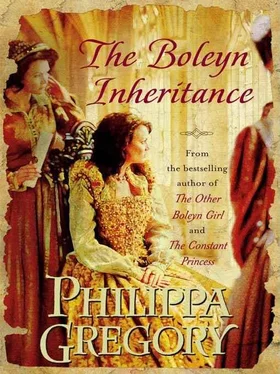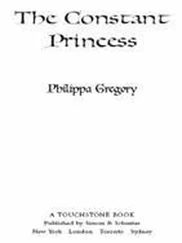
Philippa Gregory
The Boleyn Inheritance
Jane Boleyn, Blickling Hall, Norfolk,
July 1539
It is hot today, the wind blows over the flat fields and marshes with the stink of the plague. In weather like this, if my husband were still with me, we would not be trapped in one place, watching a leaden dawn and a sunset of dull red; we would be traveling with the king’s court, on progress through the weald and downland of Hampshire and Sussex, the richest and most beautiful countryside in all of England, riding high on the hilly roads and looking out for the first sight of the sea. We would be out hunting every morning, dining under the thick canopy of the trees at midday and dancing in the great hall of some country house at night in the yellow light of flickering torches. We were friends with the greatest families in the land, we were the favorites of the king, kin to the queen. We were beloved; we were the Boleyns, the most beautiful, sophisticated family at the court. Nobody knew George without desiring him, nobody could resist Anne, everyone courted me as a passport to their attention. George was dazzling – dark-haired, dark-eyed, and handsome – always mounted on the finest horses, always at the side of the queen. Anne was at the peak of her beauty and her wits, as alluring as dark honey. And I went everywhere with them.
The two of them used to ride together, racing, neck and neck like lovers, and I could hear their laughter over the thudding of the hooves as they went flying by. Sometimes, when I saw them together, so rich, so young, so beautiful, I couldn’t tell which of them I loved more.
All the court was besotted with the two of them, those dark Boleyn flirtatious looks, their high living: such gamblers, such lovers of risk; both so fervent for their reform of the church, so quick and clever in argument, so daring in their reading and thoughts. From the king to the kitchen maid there was not one person who was not dazzled by the pair of them. Even now, three years on, I cannot believe that we will never see them again. Surely, a couple so young, so radiant with life, cannot simply die? In my mind, in my heart, they are still riding out together, still young, still beautiful. And why would I not passionately long for this to be true? It has been only three years since I last saw them; three years, two months, and nine days since his careless fingers brushed against mine, and he smiled and said, “Good day, wife, I must go, I have everything to do today,” and it was a May Day morning and we were preparing for the tournament. I knew he and his sister were in trouble, but I did not know how much.
Every day in this new life of mine I walk to the crossroads in the village, where there is a dirty milestone to the London road. Picked out in mud and lichen, the carving says “ London, 120 miles.” It is such a long way, such a long way away. Every day I bend down and touch it, like a talisman, and then I turn back again to my father’s house, which is now so small to me, who has lived in the king’s greatest palaces. I live on my brother’s charity, on the goodwill of his wife who cares nothing for me, on a pension from Thomas Cromwell, the upstart moneylender, who is the king’s new great friend. I am a poor neighbor living in the shadow of the great house that was once my own, a Boleyn house, one of our many houses. I live quietly, cheaply, like a widow with no house of my own whom no man wants.
And this is because I am a widow with no house of my own whom no man wants. A woman of nearly thirty years old, with a face scored by disappointment, mother to an absent son, a widow without prospect of remarriage, the sole survivor of an unlucky family, heiress to scandal.
My dream is that one day this luck will change. I will see a messenger in Howard livery riding down this very road, bringing a letter for me, a letter from the Duke of Norfolk, to summon me back to court, to tell me that there is work for me to do again: a queen to serve, secrets to whisper, plots to hatch, the unending double-dealing life of a courtier, at which he is so expert, and I am his greatest pupil. My dream is that the world will change again, swing topsy-turvy until we are uppermost once more, and I am restored. I saved the duke once, when we were in the worst danger, and in return he saved me. Our great sorrow was that we could not save the two of them, the two who now ride and laugh and dance only in my dreams. I touch the milestone once more, and imagine that tomorrow the messenger will come. He will hold out a paper, sealed with the Howard crest deep and shiny in the red wax. “A message for Jane Boleyn, the Viscountess Rochford?” he will ask, looking at my plain kirtle and the dust on the hem of my gown, my hand stained with dirt from the London milestone.
“I will take it,” I shall say. “I am her. I have been waiting forever.” And I shall take it in my dirty hand: my inheritance.
Anne, Duchess of Cleves, Duren, Cleves,
July 1539
I hardly dare to breathe. I am as still as a block, a smile stuck on my face, my eyes wide open, looking boldly at the artist, appearing, I hope, trustworthy, my frank stare indicating honesty but not immodesty. My borrowed jewels are the best that my mother could lay her hands on, designed to show to a critical viewer that we are not quite paupers, even though my brother will offer no dowry to pay a husband. The king will have to choose me for my pleasant appearance and political connections. I have nothing else to offer. But he must choose me. I am absolutely determined that he will choose me. It is everything to me to get away from here.
On the other side of the room, carefully not observing my portrait forming under the painter’s quick, sweeping strokes of the crayon, is my sister, awaiting her turn. God forgive me, but I pray that the king does not choose her. She is eager as me for the chance to leave Cleves, and to leap to such greatness as the throne of England; but she does not need it as I do. No girl in the world can need it as I do.
Not that I will speak so much as one word against my brother, nothing now, and nothing in the years to come. I will never say anything against him. He is a model son to my mother, and a worthy successor to the dukedom of Cleves. During the last months of my poor father’s life, when he was clearly as mad as any fool, it was my brother who wrestled him into his chamber, locked the door from the outside, and publicly gave out that he had a fever. It was my brother who forbade my mother to summon physicians or even preachers to expel the devils that occupied my poor father’s wandering brains. It was my brother, cunning – like an ox is cunning, in a slow, mean way – who said that we must claim my father was a drunkard rather than allow the taint of madness to diminish our family reputation. We will not make our way in the world if there is suspicion against our blood. But if we slander our own father, call him a sot, having denied him the help that he so desperately needed, then we may yet rise. This way I will make a good marriage. This way my sister will make a good marriage. This way my brother can make a good marriage and the future of our house is assured, even though my father fought his demons alone, and without help.
Hearing my father whimper at the door of his chamber that he was a good boy now, and would we let him out? Hearing my brother answer so steadily and so firmly that he could not come out, I wondered then if actually we had it all wrong, and my brother was already as mad as my father, my mother, too, and the only sane one in this household was me, since I alone was dumb with horror at what we were doing. But I didn’t tell anyone that thought, either.
Читать дальше
Конец ознакомительного отрывка
Купить книгу













